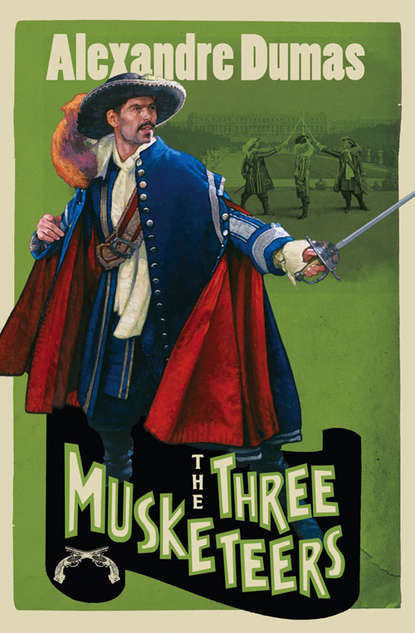По всем вопросам обращайтесь на: info@litportal.ru
(©) 2003-2024.
✖
The Three Musketeers
Автор
Год написания книги
2018
Настройки чтения
Размер шрифта
Высота строк
Поля
This announcement caused d’Artagnan to shudder with emotion. The important moment was arrived upon which, in all probability, his future fate depended. His eyes, therefore, were fixed with intense anxiety on the door through which the king was about to enter.
Louis XIII. appeared, followed by his attendants. He was attired in his hunting-dress, still covered with dust; he was heavily booted; and in his hand he held his riding-whip. At the first glance, d’Artagnan perceived that the king was in a violent rage. This humour, though distinctly visible in his majesty’s features, did not prevent the courtiers from ranging themselves along the sides of the room; and as, in the royal antechamber, it is better to be seen by an irritable and angry eye, than not to be seen at all, the three musketeers did not hesitate to step forward, although d’Artagnan, on his part, concealed himself behind them as much as possible. Yet though Athos, Porthos, and Aramis were personally known to the king, he passed on as if he had never seen them before, without either looking at or addressing them. But when his eyes rested for a moment upon M. de Treville, the latter met them with so much firmness, that the king turned aside his gaze, and, muttering to himself, entered his apartment.
“The aspects are unfavourable,” said Athos smiling; “we shall not be knighted this time.”
“Wait here ten minutes,” said M. de Treville, “and if I do not return to you in that time, proceed to my hotel as it will be useless for you to wait longer for me.”
The young men waited ten minutes, a quarter of an hour, even twenty minutes; and then, finding that M. de Treville did not return, they departed, very uneasy with the turn things were taking.
M. de Treville, who had boldly entered the royal cabinet, found his majesty in a very bad humour; he was seated in an arm-chair, venting his irritation by striking his boots with the handle of his whip. This, however, M. de Treville did not appear to notice, but with the utmost composure he inquired after his majesty’s health.
“Bad, very bad,” replied the king. “I am dull and dispirited.”
This was, in fact, the worst malady of Louis XIII., who often withdrew to a window with one of his courtiers, saying to him, “Come, sir, let us be bored together.”
“I regret to find your majesty thus,” said M. de Treville. “Have you not, then, enjoyed the pleasure of the chase?”
“A fine pleasure, truly! By my faith, all goes to ruin, and I know not whether it is the game that is no longer so swift a-foot, or the dogs that have no noses. We roused a stag of ten tines; we ran him for six hours; and when we were on the point of taking him, and just as Saint Simon was about to place his horn to his mouth, to sound the ‘mort’—crac, all the pack went off on the wrong scent, in pursuit of a brocket. You will thus see that I must now renounce the chase with hounds, as I have already relinquished it with falcons. Ah! I am a most unhappy king, M. de Treville; I had only one ger-falcon remaining, and he died yesterday.”
“Truly, sire, I can estimate your misfortune; it is, indeed, very great; but there are yet, I believe, a goodly number of falcons, hawks, and tercels, remaining.”
“But who is to train them? The falconers are all gone; and I alone now preserve the true art of venery. With me, all will be lost, and the game will hereafter be taken by snares, pitfalls, and traps. Oh! had I only leisure to instruct scholars! But then there is the cardinal, who never leaves me any leisure, and who is ever talking to me of Spain, of Austria, and of England! But apropos of the cardinal, I am very angry with you, M. de Treville.”
The latter had anticipated this turn of the conversation. From his long and intimate knowledge of the king, he was well aware that complaints of this nature were only a sort of prelude, as it were, to arouse his majesty’s courage to the proper pitch, which he had on this occasion attained.
“In what have I had the misfortune to offend your majesty?” inquired M. de Treville, feigning the utmost astonishment.
“Is it thus that you discharge your office, sir?” continued the king, answering one question by another; “was it for this that I created you captain of my musketeers—that they should assassinate a man, excite a whole neighbourhood, and threaten to burn all Paris, without your saying a word to me on the subject? However,” added the king, “without doubt you have come here to accuse yourself, and, having committed all the rioters to safe custody, inform me that justice has been satisfied.”
“Sire,” said M. de Treville, with the utmost composure, “I am, on the contrary, come to demand justice.”
“And against whom?” exclaimed the king.
“Against calumniators!” replied M. de Treville.
“Ah! this is something quite new,” rejoined the king. “Do you pretend to say that your three confounded musketeers, and your Bearnese recruit, did not rush like madmen on poor Bernajoux, and so ill-treat him, that he is probably now dying? Do you also pretend to say, that they did not lay siege to the hotel of the Duke de la Tremouille, and that they did not propose to burn it—which, during a period of war, would have been of little consequence, seeing it is merely a nest of Huguenots, but which, nevertheless, in time of peace, is a bad example. Say, are you about to deny these matters?”
“And who has related to your majesty all this fine story?” quietly demanded M. de Treville.
“Who has related to me this fine story, sir? Who should it be, pray, but he who watches whilst I sleep; who labours whilst I amuse myself; who manages everything within and without the realm; in Europe, as well as in France?”
“Your majesty no doubt means God,” said M. de Treville, “for I know no other being who can be so far above your majesty.”
“No, sir; I speak of the pillar of the state; of my only servant—of my only friend—of the cardinal.”
“His eminence is not his holiness, sir!”
“What do you mean by that, sir?”
“That it is only the pope who is infallible; the infallibility which he possesses does not extend to cardinals.”
“You would say, then,” said the king, “that he deceives me; you would say that he betrays me?”
“No, sire,” said M. de Treville, “but I say that he deceives himself; I say, that he has been deceived; I say, that he has hastily accused his majesty’s musketeers, towards whom he is unjust; and that he has not drawn his information from authentic sources.”
“The accusation comes from M. de la Tremouille—from the duke himself. What say you to that?” asked the king.
“I might say that he is too deeply interested in the question, to be an impartial witness; but, far from doing that, sire, I, knowing the duke for a loyal gentleman, willingly refer to him, but on one condition.”
“What is that?” said the king.
“It is that your majesty will send for him; will question him, but by yourself, face to face, without witnesses; and that I may see your majesty as soon as you have parted from the duke.”
“Ay, marry, indeed!” said the king; “and you will be judged by what the duke may say?”
“Yes, sire.”
“You will accept his judgment?”
“Without hesitation!” replied Treville.
“And you will submit to the reparations he may require?”
“Entirely!”
“La Chesnaye!” exclaimed the king, “La Chesnaye, let some one go immediately to inquire for M. de la Tremouille. I wish to speak with him this evening.”
“Your majesty gives me your word that you will not speak with any one between M. de la Tremouille and myself?” asked Treville.
“With no one, on the word of a gentleman!” replied the king.
“Tomorrow, then, sire?”
“Tomorrow, sir.”
“At what hour will it please your majesty?”
“At any hour you desire!”
“But in coming too early in the morning, I fear I may wake your majesty!”
“Wake me! Do I sleep? I never sleep now, sir! I may dream sometimes; nothing more. So come as early as you like, at seven o’clock if you choose; but I will not spare you, if your musketeers are in fault!”
“If my musketeers are guilty, sire, the guilty shall be delivered up to your majesty to await your pleasure. Does your majesty require anything else? You have but to speak and you shall be obeyed!”
“No, sir, no! It is not without reason that I have been named Louis the Just. Farewell, then, till tomorrow, sir! Farewell!”
“May God preserve your majesty till then!”

















